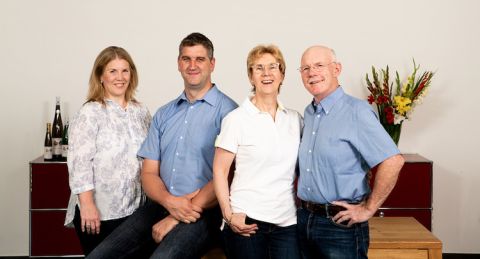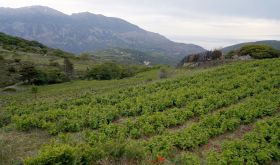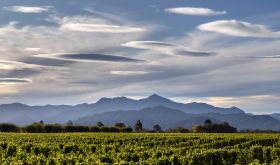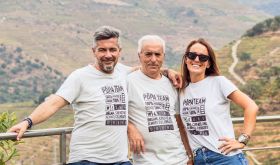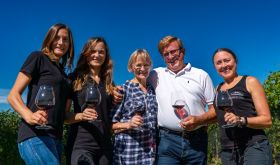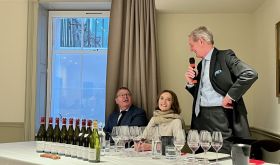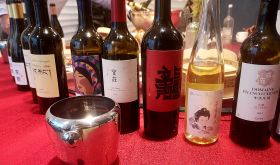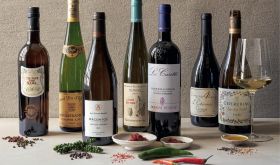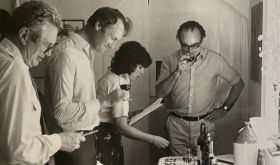From €20, £21, 24.90 Swiss francs, HK$220, $36.45
Winemaker Dorothee Zilliken might have been reading my mind (or looking in my wine rack) when she wrote, ‘Kabinett is always my favourite because it offers so much intensity of fruitiness and juiciness, but concomitant with a light alcohol level … so everybody can really ENJOY the bottle!’
If I look back over the last 15 years, I am sure that I have bought more German Kabinett-style Rieslings – those with some sweetness but with such fabulous acidity that the sweetness is more of an impression than a feature – than any other style of wine. You can read more about the special qualities of Kabinett in this article about our second Riesling Night, held in an era when such tasting events were allowed.
However much joy and pleasure this wine brings, and it certainly does that, it is a serious wine and, for a wine of this quality, the price is remarkably low. (See Jancis’s enthusiastic note and high score of 17.5 when she tasted it last year. I gave it the same score when I tasted it last weekend.)
In its youth, this wine has a stoniness that made me think of white pepper but it’s the clean-cut, deep citrus flavour, with a hint of apricot in the aftertaste, that makes it such a life-affirming, mouth-filling glass of low-alcohol (8.5%) intensity. Delicious as it is now, you could easily keep it for at least a decade to see it gain the more intriguing flavours of mature Riesling – those complex notes reminiscent of a whiff of smoky kerosene (nicer than it sounds) and delicate honey – without any loss of balance, fruit purity or, most importantly, freshness.
Although often referred to simply as Zilliken, the estate’s full name is Forstmeister Geltz Zilliken, revealing its history and distinguishing it from another Zilliken in Nittel in the Mosel Valley. It has been a family-run business since 1742, remarkably resurrected after heavy bombing in 1944. The estate was named after Forstmeister (forest superintendent) Ferdinand Geltz, who played a major role in establishing the estate in the second half of the 19th century. Zilliken was added in 1947 when Ferdinand’s granddaughter married Fritz Zilliken.
Women have played a key role throughout the history of the estate, and in 2016 Dorothee Zilliken took over from her father Hanno but it is still very much a family team. She explains: ‘During the harvesting time, my husband Philipp leads the pressing room and the cellar, guided and supported by my father; and I am responsible for the vineyard and the team of around 20 pickers. But we are all tasting together.’ Hanno’s wife Ruth is in charge of sales (and probably many other things …).
Having seen the complexity and potential conflicts involved in generational handovers, I asked Dorothee if she had made many changes since taking the lead. It’s good news for those who love the full-fruited and precise Zilliken style: ‘All in all, I would like to continue the work of my father, because that's how I prefer to drink our wines. So I don't want to change the style of the wines. There are only tiny things I am adjusting (for example we have sown some green cover crops in the vineyard). I am very glad that I can take advantage of the great experience of my father and to take advantage of all the ideas and visions of my mother, and of the small inventions and great work and visions of my husband Philipp.’
The estate, comprising 11 ha (27 acres) in the Rausch vineyard in Saarburg (pictured) and 1 ha in the Bockstein vineyard in Ockfen, is located in Saarburg in the Saar Valley, a tributary of the Mosel, and one of Germany’s coolest wine regions, with sunny, steep, hard-to-work, slate slopes that have benefited from the warming temperatures of climate change. (The vineyards – and contours – are marked on this detailed World Atlas of Wine map.) The Zillikens make several styles of wine from Saarburger Rausch, including a Spätlese, sweeter than the Kabinett, the 2012 vintage of which was Jancis’s wine of the week in 2016.
The Kabinett, like all their wines, is fermented in 60- to 70-year-old untoasted German oak casks knowns as Fuder. They hold around 1,000 litres and, thanks to their size and age, impart no oak flavour whatsoever. Dorothee explains why she likes working with these casks: ‘Of course it is much more work to use those barrels, instead of working with stainless-steel. But we think the fermentation in those barrels is fining the wine a tiny bit and offers a round mouthfeel. So we accept more work for a more typical taste … I really like the feeling of being able to work with barrels that have been used by my grandfather! It is also a part of sustainability.’ (They do need to buy new casks every now and again but it takes three years after the order has been placed for the cask to arrive at the winery.)
The cellar is so cool that they inoculate some of the casks to start the fermentation, particularly for their dry wines, but with the wines that do not need to ferment to dryness, they allow some casks to ferment spontaneously. In this 2019 Kabinett, there was approximately 60 g/l residual sugar and total acidity of 7.4 g/l when the wine stopped fermenting of its own accord. When you taste the wine, you would never guess it had this much residual sugar, thanks to the high acidity and the very low pH (2.9). When I mentioned this to Dorothee, she agreed: ‘The taste of the acidity and the herbal components are helping the Kabinett to show all his freshness and the typical elegance of the Saar.’
2019 was not an easy year in the vineyard. Frost in the lower part of their Rausch holdings meant they had to discard some fruit. The harvest was a week later than in 2018 and reminds Dorothee a little bit of 2015 but with ‘the inherent lightness of 2014’.
That inherent lightness is indeed at the core of this beautifully balanced wine.
The wine is imported into the UK by Howard Ripley and is available from them either duty paid or in bond. The Wine Society is offering the best price at £21 a bottle. The wine is also available in the US, Germany, Switzerland, Italy and Hong Kong. See the full list of worldwide and European distributors on the producer's website.
Find out much more about Riesling on JancisRobinson.com


